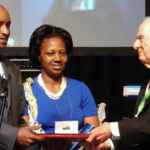FREMONT, Calif. (ABP)—She gets up early, traveling all day to teach Bible studies and lead worship services. She must remain unknown to keep the churches she works with safe. She does her work quietly, fearing persecution—or worse—if government officials learn what she is doing.
She is a woman who heard a message of hope through Jesus and decided to become a Christian. She is an indigenous church planter who now shares the same message she heard where she lives—a predominantly Muslim country in the Middle East.

Female church planters are sharing the gospel in the Middle East despite fear of persecution. (CBF PHOTO/Courtesy of Annette Ellard)
|
She has no assurance when she begins her day that she will not be killed by the end of it for the work she is doing. For her, letting others know about the hope in Jesus that she has found is worth the risk she takes in doing so.
This year, a portion of the Cooperative Baptist Fellowship’s Jimmy and Rosalynn Carter Offering for Religious Liberty and Human Rights will support this woman and dozens more who work through an international organization that trains new believers to build house churches. The offering will be collected during this year’s CBF general assembly, July 2-3 in Houston.
“We are so excited (that this project) is included in the Carter Offering,” said Lita Sample, one of CBF’s field personnel. Sample and her husband, Rick, are based in Fremont, Calif., where they work with internationals in the Bay Area and partner with various groups to support work in the Middle East.
“There is no religious liberty outside of Islam in this country,” Sample said. “However, people are hungry for Christ and so very open to the gospel. But the laws and the punishments for converting are getting more strict.”

Veiled Egyptian women walk past the pyramids in Giza. (REUTERS/Tarek Mostafa)
|
Currently 135 women have been trained as church planters through the group. The Carter Offering will provide financial support for some of these women. A salary of $400 a month would provide for one woman’s basic needs and would be just above the poverty level.
Sign up for our weekly edition and get all our headlines in your inbox on Thursdays
“These women need support so they can continue to do what they do,” Sample said. “It is a great need for a great work. What we do here in the U.S. with prayer and financial support helps indigenous women to share the gospel. We share in reaching this part of the world.”
Each qualifying recipient of the funds already has planted at least three churches and is actively leading them, as well as actively witnessing and tithing. Each woman also has demonstrated that her priority is to do the work of her ministry; has completed foundational classes in Christianity, baptism and kingdom living; and has completed three basic leadership classes. The church planters all are associated with an international organization to which they are accountable through monthly reports and supervision.
Many Muslims find their way to these churches through indigenous-language Christian broadcasts, but an increasing number also come through word of mouth as believers multiply and share Christ throughout the Middle East.
“There are those that come to know Christ through this ministry,” Sample said. “When they come to know Christ, a local believer disciples and encourages them. After a time, they are introduced to a local church, or if there is none, a new church is planted.”














We seek to connect God’s story and God’s people around the world. To learn more about God’s story, click here.
Send comments and feedback to Eric Black, our editor. For comments to be published, please specify “letter to the editor.” Maximum length for publication is 300 words.